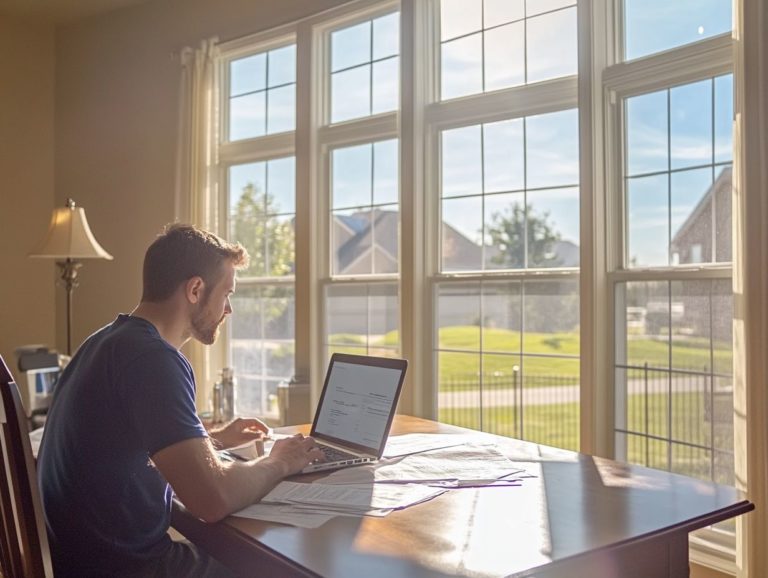The Impact of Location on Home Insurance Types
Choosing the right home insurance can be a daunting task, especially with so many factors to consider.
One of the biggest influences on your policy is your home s location. From the risks posed by natural disasters to unique local regulations, understanding how geography affects your coverage is crucial.
This article will explore the various types of home insurance, the specific requirements that come with different areas, and provides valuable tips to help you secure the best policy tailored to your needs.
Dive in to make sure your home is fully protected!
Contents
- Key Takeaways:
- Factors That Affect Home Insurance
- Types of Home Insurance
- Home Insurance Requirements by Location
- How Location Affects Home Insurance Premiums
- Tips for Finding the Right Home Insurance for Your Location
- Frequently Asked Questions
- What factors influence the type of home insurance needed?
- How does location impact home insurance rates?
- What types of home insurance are affected by location?
- Are there specific location-based insurance requirements?
- How can I determine if my location will impact my home insurance?
- Can I change my home insurance coverage if I move to a different location?
Key Takeaways:

Location is a crucial factor in determining the type of home insurance coverage you need.
Homes in high-risk locations, such as flood-prone areas, may require additional insurance coverage.
Premiums for home insurance can vary significantly based on location, so it’s important to compare options and consider all factors before choosing a policy, especially the impact of natural disasters on home insurance.
Explanation of Home Insurance and Its Importance
Home insurance serves as a vital financial safety net for you as a homeowner, safeguarding against potential damages to your property while providing peace of mind during unforeseen incidents.
This type of insurance typically covers events like fire, flooding, and theft, ensuring that you can manage the costs of repairs or rebuilding.
Various insurance companies offer policies specifically tailored to meet the unique needs of Florida homes. This allows you to secure adequate dwelling coverage and premiums that reflect your individual risk profile.
Understanding home insurance policies is essential for making informed decisions. Policies vary significantly in coverage limits and the types of damages covered, from structural issues to personal property losses.
For example, knowing about insurance deductibles can save you from unexpected surprises when filing a claim, as these amounts are deducted from your payout. Policy limits specify the maximum reimbursement available, which can fluctuate depending on the type of loss.
It’s also crucial for you to familiarize yourself with the claims process. Accurately documenting damages and collaborating effectively with your insurer can ensure you receive timely compensation, turning a potentially stressful situation into a manageable one.
Factors That Affect Home Insurance
Numerous factors play an important role in shaping home insurance premiums, and understanding these elements is essential for you as a homeowner in pursuit of optimal coverage options.
Key considerations include the type of construction of your home be it masonry or another material as well as its overall square footage.
Insurance agents frequently evaluate the distance to fire stations and hydrants, alongside local crime rates, when assessing the risk factors that ultimately influence your insurance rates.
Location as a Key Factor
Location plays a crucial role in determining your home insurance rates and coverage, especially for homeowners in Florida, where being close to water can greatly impact understanding the perils in home insurance types and flood insurance requirements.
If your home is in a high-risk flood zone, you might find yourself facing higher premiums. Conversely, homes located near fire stations often enjoy discounts due to the reduced risk of fire damage.
If you live in an area with high crime rates, your insurance costs will likely be higher, underscoring the need to understand local factors when choosing your homeowner’s insurance policy.
Regional weather patterns and geological features affect insurance costs. Living in areas vulnerable to hurricanes or wildfires can lead to skyrocketing premiums, reflecting the increased risk of damage. Your awareness of local building codes and neighborhood safety can further influence how insurers evaluate risk.
By grasping these geographic implications, you can make informed decisions and strategize effectively, paving the way for potential savings on your insurance premiums.
Types of Home Insurance

As a homeowner, you have a range of home insurance options at your disposal, each crafted to cater to specific needs and circumstances.
The most prevalent choices include standard homeowners insurance policies. These provide dwelling coverage, safeguarding the structure of your home.
Specialized insurance policies cater to particular risks. For example, flood insurance is essential for properties in flood-prone areas.
Understanding the intricacies of these insurance policies is essential for determining the appropriate coverage amount and ensuring you have robust protection against potential losses.
Overview of Different Types
An overview of the types of home insurance reveals many options. These policies shield your home s structure with dwelling coverage and protect your personal belongings against theft, damage, or loss.
You can also take advantage of liability insurance, which covers accidental injuries that may occur on your property. This offers you peace of mind in various situations.
You can customize your coverage with endorsements. These address specific risks like natural disasters or valuable collections.
The flexibility to adjust deductibles and coverage limits allows you to strike a balance between cost and protection. This ensures it aligns perfectly with your lifestyle and the distinct challenges you encounter.
Home Insurance Requirements by Location
Home insurance requirements can vary greatly based on the location of your property. Local regulations and building codes are often determined by homebuilders and governing authorities.
Homeowners in Florida encounter unique insurance needs. The heightened risk of hurricanes and flooding demands specialized coverage and strict adherence to building standards.
Understanding these requirements is crucial, as it ensures compliance and helps you secure the best insurance options for your property.
Specific Requirements for Different Locations
Home insurance requirements depend on local regulations and unique risk factors. For instance, if your home is in a high-risk flood zone, you may need flood insurance.
Similarly, if you live in an area that frequently faces wildfires, you might need additional structure coverage. Understanding these localized insurance requirements is vital to adequately protect your investment.
Local building codes dictate your insurance necessities. Certain areas enforce stricter standards to enhance fire safety or reduce wind damage.
It s wise to familiarize yourself with these codes to avoid any potential gaps in your coverage. Additionally, regional factors such as historical weather patterns and proximity to emergency services can further influence the insurance policies you should have in place.
By staying informed about these elements, you can ensure that the protection you choose is tailored to your specific location, ultimately safeguarding both your home and your financial well-being.
How Location Affects Home Insurance Premiums

Location is crucial in shaping your home insurance premiums, with several factors influencing the rates you encounter as a homeowner. For a better grasp of how these factors play a role, check out this understanding homeowners insurance types.
For example, if your home is in an area with high crime rates, you may find yourself facing higher premiums. Properties near fire hydrants and fire stations often enjoy reduced rates thanks to the lower associated risks.
Geographic elements, such as your proximity to water and local building codes, significantly affect your home insurance costs, so it’s important to understand the limits of home insurance types.
Factors that Determine Premiums
Several critical factors influence your home insurance premiums, including your property’s location, the quality of building materials, and whether you have a home security system in place.
Understanding these elements is essential for homeowners looking to secure the best rates. Insurance companies assess risk by considering factors such as neighborhood crime statistics and the distance of your home from fire stations or emergency services.
The construction materials you choose, especially fire-resistant options, can positively affect your rates by minimizing the risk of damage. If your house has advanced security technologies, it can deter break-ins and lead to significant discounts on your insurance premiums, encouraging you to prioritize safety.
Tips for Finding the Right Home Insurance for Your Location
Finding the ideal home insurance for your location requires a thoughtful assessment of your unique needs. Make informed comparisons and tap into the expertise of an insurance agent.
Start by evaluating your coverage requirements based on the value of your property, local risks, and available insurance discounts. Collaborating with knowledgeable insurance agents can provide valuable insights into tailored policies that suit your individual circumstances, ensuring comprehensive protection for your Florida home.
Considerations and Comparison Tips
When exploring home insurance options, weigh various factors and make thoughtful comparisons to choose the policy that fits your needs.
Key considerations include the coverage amount, specific insurance requirements for your location, and the reputations of different insurance companies.
Consulting with experienced insurance agents can offer insights into potential policy limits and coverage options tailored to your situation.
You should thoroughly assess the deductibles and the types of perils covered by each policy, whether they are natural disasters or theft.
Understanding the difference between replacement cost and actual cash value will help you make informed decisions. Checking financial ratings and customer reviews of insurers can provide insights into their reliability and customer service efficiency, ensuring peace of mind.
By evaluating all these aspects, you can create a comprehensive insurance strategy that protects your investment and aligns with your unique lifestyle needs.
Frequently Asked Questions

What factors influence the type of home insurance needed?
The location of your home is a major factor impacting the type of home insurance required. To make informed decisions, it’s important to explore understanding the differences in home insurance types. Other factors include the age and condition of the home, the value of personal belongings, and potential risks or hazards in the area.
How does location impact home insurance rates?
Location significantly affects home insurance rates. Homes in areas prone to natural disasters, such as hurricanes or earthquakes, typically have higher rates due to the increased risk of damage. Additionally, understanding the impact of pets on home insurance types can also influence rates, as homes in high-crime areas often face higher rates because of the increased risk of theft or vandalism.
What types of home insurance are affected by location?
All types of home insurance, including homeowners, renters, and condo insurance, can be impacted by location. The specific coverage and rates vary by the insured property’s location, making it important to consider the top considerations for home insurance types.
Are there specific location-based insurance requirements?
Some locations may have specific insurance requirements for homes in certain areas. For instance, homes in flood-prone areas may need flood insurance in addition to regular home insurance.
How can I determine if my location will impact my home insurance?
If you’re unsure how your location may impact your home insurance, consult a licensed insurance agent. They can assess your specific location and provide information on potential impacts on your insurance needs and rates. Don t wait! Consult an agent today to secure the best coverage for your home.
Can I change my home insurance coverage if I move to a different location?
Yes, your insurance needs change when you move. Review your home insurance policy to ensure you have the right protection for your new home.
Update your policy to better fit your new location. This step is crucial to safeguard your investment!






